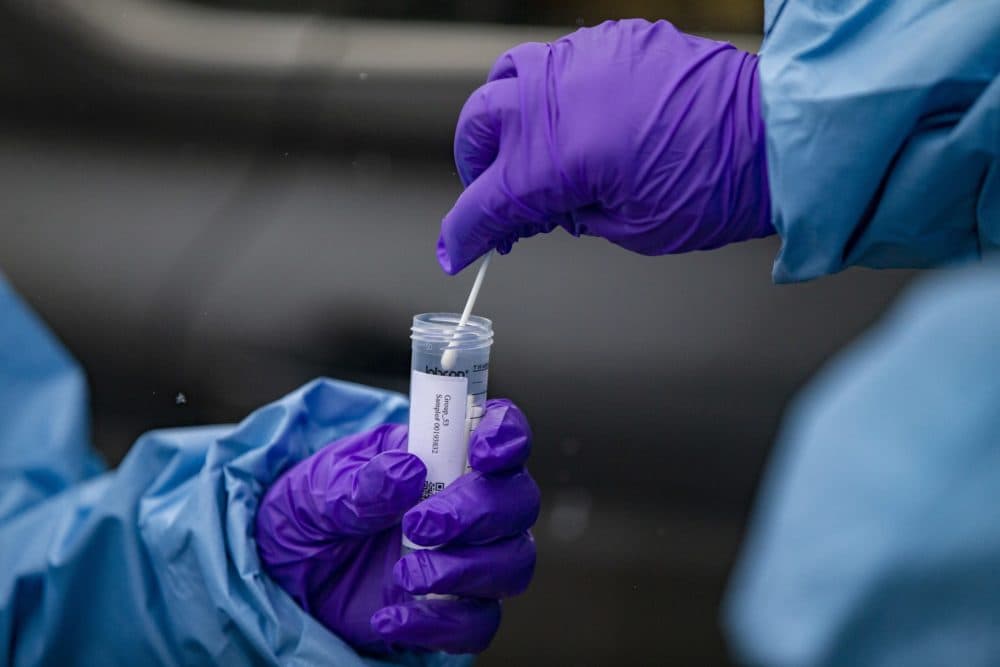Advertisement
What to do if you test positive for COVID-19 amid latest surge

Since Christmas Eve, nearly 100,000 confirmed cases of COVID-19 have been recorded in Massachusetts. The number of people testing positive shows no real signs of slowing down just yet.
Dr. Gabriela Andujar Vazquez, an infectious disease physician and associate hospital epidemiologist at Tufts Medical Center, joined WBUR's Morning Edition to discuss the surge.
Interview Highlights
What is your advice to people who take a test and have it come back positive at home?
"So if you have a test, the first step is to stay home, right? Isolate. We usually make sure that you monitor symptoms if you have symptoms. And we advise that if you need to get medical attention, you should go right away, get medical attention. If you live with other people at home, then sometimes isolation can be tricky. ... The majority of the time we try to tell people to try to separate in different rooms and from other household members as much as possible. ... You should isolate even if you don't have symptoms. And the duration of isolation is the same as if you had symptoms."
What if you test positive, but other people in your home don't?
"So when other people don't, I know I hear a lot of people say, 'Well, they must have had it, right? We've been in close contact for a long time.' And they may, but if they test negative at the moment that they know they were exposed to you, you should still try to isolate as much as possible. Sometimes it's difficult, right? If we have kids or family members that we take care of. And so it's trying to minimize as much as you can the close contact with that individual. So wearing a mask while you're around others at home can help tremendously, and good hand hygiene. And if you can, and you have more than one bathroom, designate one bathroom for you and the other for the other group of people in the house."
How reliable are home tests compared to tests at a medical center?
"There's different test kits out there and I think they're a good tool for public health purposes and to quickly know if you are positive. I always encourage everyone to get a medically done or observed test, mainly because if you're positive, you want to have that documentation that you had it for other purposes. ... [Home tests] are reliable, they're very sensitive, especially if you have symptoms. When you don't have any symptoms and you're doing it because you think you were exposed or you just want to do it because you want to know, the sensitivity of the test decreases. But [home tests] still are a helpful tool to try to identify quickly. Although I always encourage, if people can, to get that PCR test that is done in a health care facility."
We've heard emergency room doctors and nurses say they are at a breaking point with this latest surge. What's your experience been like?
"I'm currently in the hospital service and it is busy. You know, anecdotally, we are seeing an increase in the hospitalizations and COVID-19, although the hospitalizations seem to be milder than with the previous surges with delta and alpha, meaning a lot of the patients are being admitted to the medical floors, but not necessarily the majority to the intensive care units, which is a good sign that it's likely that this variant is milder than the previous variants that we've seen. But we are also busy with non-COVID related issues, probably related to the delay of care throughout the pandemic. And so we have been to a breaking point that hopefully will get better in the next couple of weeks."
Do you see any signs of optimism or any kind of glimmer of hope in this latest surge?
"Absolutely. I think that I am hopeful looking at the numbers from other countries like South Africa and U.K. who started to surge omicron before we did. They plummeted their cases rather quickly. So I think that we are predicting that in the next two weeks or mid-January, we may start seeing the decrease in cases. The other hopeful thing about this particular variant is that it's not as severe as the previous variants like delta and alpha. You know, a lot of people are getting infected, it feels like COVID is knocking on our doors, but I think that at this moment, even if we are getting infected and we are fully vaccinated and more so if we're boosted, we will do OK."
This segment aired on January 5, 2022.
